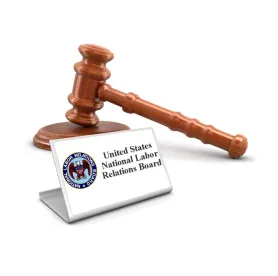Earlier this month, the National Labor Relations Board (“NLRB”) issued its decision in McLaren Macomb, 372 NLRB No. 58 (2023), holding that not only are most non-disparagement and confidentiality clauses signed by employees covered by the National Labor Relations Act (“Act”) void as a matter of policy, but merely including one in a proposed severance agreement to an employee violates the Act.
The decision left a number of questions to be answered as to how this decision would be enforced going forward, and, on March 22, 2023, National Labor Relations Board General Counsel Jennifer Abruzzo issued a Memorandum to Regional Directors proving, once again, that the current Board would be taking an extremely aggressive, pro-employee perspective on enforcement.
While this Memorandum does not have the same effect as a NLRB decision, it sheds light on how the Office of the General Counsel and the Regions will respond to potential unfair labor practice charges concerning these issues and gives plaintiffs’ and union counsel a strong basis for resisting any effort to include non-disparagement and confidentiality provisions in future agreements.
According to the General Counsel:
-
The decision applies retroactively. GC Abruzzo noted that agreements entered into prior to February 21, 2023 could be invalidated because the NLRB did not state that “manifest injustice” prevents retroactive application. Section 10(b) of the Act provides for a six (6) month statute of limitations, but GC Abruzzo stated that she viewed an employer as committing a continuing violation for maintaining and/or enforcing a previously-entered severance agreement with unlawful provisions. This interpretation could effectively extend the limitations period beyond six months. Abruzzo remarked that employers may consider remedying potential violations now by proactively contacting former employees subject to severance agreements that contain overly broad provisions and advising them that the provisions are null and void and that the employer will not seek enforcement of such restrictions. In the case a charge is subsequently filed, Abruzzo noted that such measures could form the basis for consideration of a merit dismissal by the NLRB.
-
Confidentiality provisions are lawful under only limited circumstances. According to GC Abruzzo, lawful confidentiality provisions in separation agreements must be: (1) “narrowly tailored”; (2) targeted to proprietary or trade secret information; (3) limited in temporal scope; and (4) based on legitimate business justifications.
-
Only “non-defamation” clauses are lawful now. GC Abruzzo stated that “public statements by employees about the workplace are central to the exercise of employees’ rights under the Act.” With this as the backdrop, she observed that a “narrowly-tailored, justified, non-disparagement provision that is limited to employee statements about the employer that meet the definition of defamation as being maliciously untrue, such that they are made with knowledge of their falsity or with reckless disregard for their truth or falsity, may be found lawful.”
-
Unlawful provisions are severable—even without a severability clause. GC Abruzzo noted that Regions should seek to have offending provisions voided out of the agreement, as opposed to nullifying the entire agreement—regardless of whether the agreement contains a severability clause.
-
This is not waivable. So, you cannot propose or negotiate a clause with a Union or an employee’s counsel. GC Abruzzo reiterated multiple times that the Board “protects public rights that cannot be waived in a manner that prevents future exercise of those rights regardless of who initially raised the issue.” She concluded, therefore, that even if employees themselves request broad clauses or a Union agrees to such provisions in separation agreements, such provisions remain unlawful.
-
A “savings clause” or disclaimer will not save overbroad provisions. Abruzzo suggested that, without an express statement of the rights afforded to employees under the Act, a clause or disclaimer indicating that certain provisions “do not apply to an employee’s Section 7 rights” would not save overbroad language.
-
While the decision generally applies to severance agreements proffered to statutory “employees” under the Act, it could stretch to supervisors and managers in one very limited situation. While GC Abruzzo conceded that “supervisors are generally not protected by the Act,” she noted that Board precedent protects supervisors from retaliation if the supervisor refuses to act on the employer’s behalf in committing an unfair labor practice. In such a case, GC Abruzzo posited that a separation agreement offered to a supervisor in connection with that supervisor’s protected conduct could be subject to the standards set forth in McLaren.
-
Other types of provisions may be at risk. Abruzzo also suggested that non-compete clauses, non-solicitation clauses, no-poaching clauses, and other similar provisions might interfere with employees’ Section 7 rights and could be subject to future challenge and evaluation by her Office.
* * * * *
This guidance from the General Counsel’s Office provides helpful insight into how the General Counsel and the Regions likely will view a number of issues associated with the McLaren decision. However, it remains to be seen how the NLRB and, eventually, the Courts will evaluate these issues when presented in pending cases.





 />i
/>i

